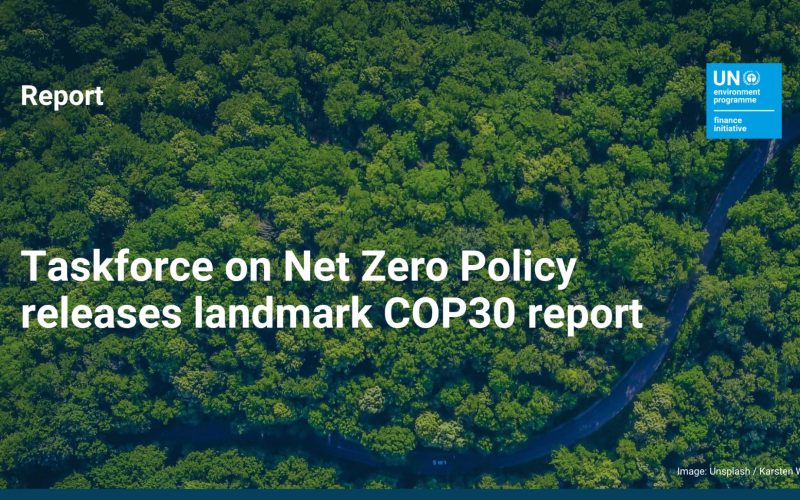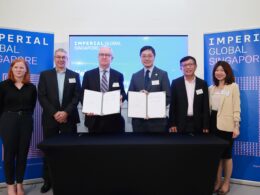The Taskforce on Net Zero Policy (TNZP) has released its COP30 report, Policy Matters: From Pledges to Delivery – A Decade After Paris, offering an independent assessment of global progress on net-zero policy and identifying gaps that remain across major economies. The report, launched on 11 November at the Spanish Pavilion and the UN Global Compact Pavilion in Belém, Brazil, sets out current regulatory trends and implications for governments, companies and financial institutions.
According to the report, the global climate policy landscape has changed significantly since the Paris Agreement. The number of targeted net-zero regulations in G20 countries has tripled since 2020, with more than 1,000 policy instruments now in place. The Oxford Climate Policy Monitor observes that while policy adjustments in the United States and European Union have attracted attention, “the centre of gravity for climate policy is shifting to the Global South and Asia-Pacific,” where new frameworks and policy innovation are becoming more prominent.
Despite political uncertainty and mixed signals in some markets, the Taskforce finds that global policy development has remained broadly steady since COP29. Over 60% of global GDP is now covered by jurisdictions adopting or moving towards ISSB-aligned disclosure requirements. Nearly 60 sustainable finance taxonomies are under development, and climate litigation has increased by 250% since 2017, expanding legal scrutiny of climate-related claims.
Reflecting on the decade since the Paris Agreement, TNZP Co-Chair Helena Viñes Fiestas said: “This is not a moment for despondency. We have the tools, the technologies, and the commitments. At a time of rising political uncertainty, bold, system-wide policy action is essential to limit the scale and duration of the 1.5°C overshoot — and to reduce its economic and human cost. Now is the time to redouble our efforts, with determination and deliberate action. COP30 in Brazil is a vital opportunity to put the Paris Agreement back on track and chart a credible path to mobilising the $1.3 trillion needed annually in climate finance by 2035.”
The report states that meeting the 1.5°C goal will require integrating net-zero targets into transition plans, governance structures and wider economic policy. It calls for detailed, economy-wide policy frameworks; resilience-focused measures that incorporate adaptation, nature and social considerations; and clearer rules to support high-integrity carbon markets. Stronger accountability, including mandatory disclosure and third-party verification, is also emphasised.
National governments remain central to implementation through Nationally Determined Contributions (NDCs), National Adaptation Plans and National Biodiversity Strategies and Action Plans (NBSAPs). However, TNZP warns that current policy signals remain fragmented and do not yet provide the certainty needed for long-term corporate and financial planning. The report also notes increased lobbying activity from fossil-fuel interests, stating that evidence points to “successful influence on policy” in several jurisdictions, and calls for greater transparency around corporate political engagement.
Carbon dioxide removals are described as “essential tools” for achieving net zero, particularly in addressing any temperature overshoot. Governments are encouraged to support high-durability removals and integrate them into national and multilateral frameworks.
The role of policy coherence received significant attention from expert commentators featured in the report. Catherine McKenna, Chair of the UN High-Level Expert Group on Net-Zero Commitments, said: “The Taskforce on Net Zero Policy has once again produced a critical window into how climate policies continue to grow and mature around the world despite myriad challenges. This is critical for non-state actors who rely on stable, ambitious and globally comparable signals to make investment and operating decisions. Ten years after the Paris Agreement, clean energy growth, policy innovation, and widespread adoption of net-zero targets have fundamentally reshaped global energy trends. This is no time to slow down.”
Eric Usher, Head of UNEP Finance Initiative, said: “It is clearer than ever that credible net-zero pathways depend on coherent policy frameworks, which financial institutions need to deliver on their transition plans. The Taskforce’s report shows that progress is under way, but not at the speed required. We encourage policymakers, the finance sector and industry to work together to turn fragmented reforms into an integrated investment agenda that mobilises capital, supports a just transition and accelerates a net-zero, nature-positive global economy.”
Selwin Hart, UN Special Adviser and Assistant Secretary-General for Climate Action, added: “Policy development to support non-state actors is progressing, mirroring the improved quality and robustness of the NDCs across the developing world. The Policy Matters report shows the centre of gravity is shifting to the Global South and Asia-Pacific.”
Laurence Tubiana, CEO of the European Climate Foundation, commented: “We cannot solve tomorrow’s problems with yesterday’s tools. This report brings fresh thinking and systemic insight, which is exactly what we need to accelerate the transition and rethink our economic models. It reflects the spirit of the Paris Agreement, and keeps countries to task. As we approach COP30, it’s vital that we move from dialogue to delivery.”
Looking towards COP31, the report identifies three priority areas: reviewing the effectiveness of existing policy instruments, strengthening cooperation across jurisdictions, and improving alignment between sustainable finance frameworks and real-economy decarbonisation measures.
TNZP, established at COP28, continues to support the UN High-Level Expert Group’s efforts to strengthen standards for net-zero commitments from non-state entities. This latest analysis builds on earlier reports examining G20 policy progress and examples of emerging good practice.

















